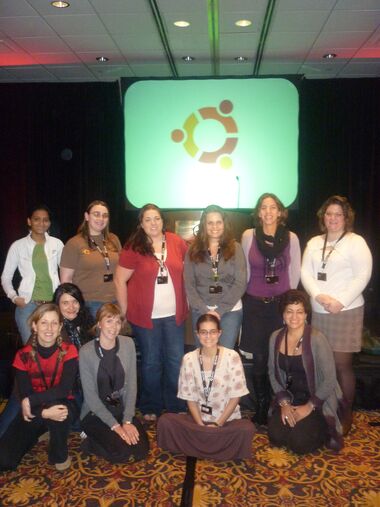
Ubuntu Women logo
Ubuntu is a Linux distribution, and an open source project which bills itself as "Linux for human beings" and as being a more approachable, friendlier Linux distribution. The word "Ubuntu" is an African term which is hard to describe, but encompasses humanity, openness, generosity of spirit, etc. (See Ubuntu (philosophy) on Wikipedia.) This ideal is reflected in the Ubuntu community's code of conduct, which all community members must sign.
Contents
Women in Ubuntu
A 2006 census of the Ubuntu community[1] found 2.4% women.
The Ubuntu Women group runs a mailing list, website, and IRC channel to support women in the Ubuntu community. Anyone who is interested in supporting women in Ubuntu is welcome in those forums (i.e. they are mixed gender forums.)

About half of the women who attended UDS Lucid: Back: Surbhi Palande, Elizabeth Krumbach, Laura Czajkowski, Ursula Junque, Ara Pulido, Amber Graner; Front: Marianna, Maria, Claire Newman, Mackenzie Morgan, Jane Silber
The following women are notable Ubuntu contributors and community members:
- Vid Ayer
- Laura Czajkowski
- Melissa Draper
- Amber Graner
- Sarah Hobbs
- Emma Jane Hogbin
- Ursula Junque
- Maia Kozheva
- Elizabeth Krumbach
- Mackenzie Morgan
- Leann Ogasawara
- Surbhi Palande
- Celeste Lyn Paul
- Lydia Pintscher
- Ara Pulido
- Myriam Schweingruber
- More at: Ubuntu Women Profiles & Ubuntu Women Interviews
See also: List of women in Open Source
Code of Conduct
The Ubuntu Code of conduct is a document expressing what is expected of Ubuntu contributors. It says that contributors will:
- Be considerate.
- Be respectful.
- Be collaborative.
- When we disagree, we consult others.
- When we are unsure, we ask for help.
- Step down considerately.
The full text is available at http://www.ubuntu.com/community/conduct
An additional leadership code of conduct applies to those in leadership roles.
The code of conduct was updated in October 2009, with the following goals:
- Broaden the scope to include contributors who are not developers or packagers
- Refer to community structures that have emerged since the CoC was first written (eg. the Community Council)
- Remove joking reference to Mark Shuttleworth being perfect (at least one person chose not to sign the CoC because of this[2])
The Ubuntu Code of Conduct is released under a Creative Commons license, and has inspired some other projects (eg. the Sugar project) to have similar codes of conduct.
At times there have been complaints that the Ubuntu Code of Conduct is not enforced. The Ubuntu Code of Conduct incident describes one such situation which occurred in 2007, where someone posted a sexist joke to an Ubuntu mailing list but was not reprimanded for it. Instead, Ubuntu's community manager called for balance/moderation in applying the CoC, and the woman who had complained ended up leaving the Ubuntu community.
Marketing
Ubuntu's marketing materials generally include people of various genders and races. Ubuntu tshirts are also available in women's sizes[3].
Ubuntu Women
The Ubuntu Women subproject aims to support and mentor women contributing or interested in contributing to Ubuntu.
Incidents
Many incidents involving women in Ubuntu stem from the desire to be inclusive of women, but awkwardness in expressing it in a way which does not marginalise women who are already using Ubuntu. See, eg:
- "even included some wives" thread on Ubuntu Marketing
- Mark Shuttleworth at Linuxcon
- The Ubuntu community makes widespread use of the So simple, your mother could do it idea
Other incidents include:
- Ubuntu Code of Conduct incident
- Ubuntu is going to be sexy!
- Ubuntero gendered name
- Launchpad users encouraged to use real names
- Ubuntu Warty visual theme
- Russian commentary on Ubuntu Women leadership
- Ubuntu-women logging proposal
Further reading/commentary/etc
- Ubuntu Women Project Status – Early 2009 by Elizabeth Krumbach
- Women and Ubuntu by Christopher Tozzi
- Planet Ubuntu-Women

